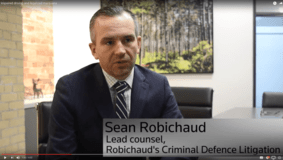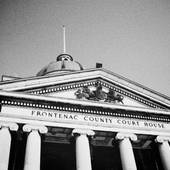Our Firm in the News

Here you will find a compilation of our firm and its lawyers featured throughout local, provincial, and national news relating to criminal legal matters.
Click on the (+) icons below to expand stories and articles. (Some featured posts are open by default).
Regardless of the verdict, there was going to be significant public interest and discussion around the case, says Jacob Roth, associate counsel at Robichaud’s Criminal Defence. Streaming the ruling on YouTube allows the public to go “right to the source,” and skip an intermediary who may omit details.
“I think broadcasting any verdict on YouTube is an extension of the open-courts principle. And the more transparency we could have in the justice system, the better,” says Roth.
“In a series of tweets, lawyer Sean Robichaud said that people had contacted him regarding these demands for settlements in amounts “far above damages,” with the usual demand set at $500. Tagging the Law Society of Ontario, he suggested that such practice should be banned because it reflected badly upon the legal profession.”
“Criminal lawyer Sean Robichaud said one way to reduce the virus’ spread would be a court announcement “that no bench warrants (warrants with discretion) will issue for non-trial matters for the next four weeks so we can recalibrate and think of strategies.”
Toronto defence lawyer Sean Robichaud said while he never issues blanket vetoes on potential jurors based on ethnicity, he is mindful of people who seem like they wouldn’t be able to relate a client coming from a high crime area.
“If you have a group of very affluent engineers and accountants who went from Upper Canada private school and off to Queen’s, they’re not going to get why your client is carrying a gun all the time and they may not be sympathetic to that.”
“It’s like an iron fist in a velvet glove,” says Thomas Surmanski, a criminal defence lawyer at Robichaud’s Criminal Defence Litigation.
“I saw it as an unreasonable response to (Jian) Ghomeshi,” says Surmanski. “This is creating a tripartite system where there’s the accused, the complainant, and the government of Canada.”
“I have recently been dealing with the shockwaves (of Bill C-75),” says Surmanski, who wrote at length last year about what the bill would actually mean.
According to Arntfield the solution is to apply for record destruction after receiving the pardon, a step of which many individuals are simply unaware. On the other hand, criminal lawyer Sean Robichaud, based in Toronto, said, “It is not a solution, because record destruction is not actual destruction,” he told Global News. “There is no such thing as record destruction, quote-unquote. The information of the occurrence itself still exists.”
“Canadian society, most of us, have come to see marijuana as something that is non-criminal,” says Toronto-based criminal lawyer Sean Robichaud. “It doesn’t have a criminal stigmatization, but in the United States it’s very different. The practical effects of the prejudice are going to come at the U.S. border, not here in Canada.”
Sean Robichaud, the founder of Robichaud’s Criminal Lawyers, says he’s encouraged by the project, noting that he gets a reminder of how little laypeople know about the inner workings of the justice system every time he runs a jury trial.
“It seems like the jury and the law students are seeing everything for the first time. That level of ignorance is not right,” he says.
“If we expect people to have respect for the courts, it’s only going to come through transparency.
Toronto criminal defence lawyer Sean Robichaud also welcomes the decision, as it has “likely quelled a great amount of anxiety among defence lawyers and other litigators who advocate for controversial positions and clients.”
“Until this decision, there was a very omnipresent and realistic concern among lawyers’ that their duty to their clients might be compromised in the face of a regulators overly broad, ex post facto, scrutiny,” he wrote in an email. “Personally, as a defence lawyer, this decision has encouraged me to continue acting for my clients fearlessly. It’s comforting to know the Supreme Court has our back and the invaluable role we play within a healthy democratic system.”
Sean Robichaud, who runs his own criminal defence practice in Toronto, says eliminating peremptory challenges is a simplistic and counterproductive conclusion.
Robichaud brought me to a downtown Toronto courthouse to see first-hand how peremptory challenges can be used — but not necessarily as they’ve been billed. In the courtroom were dozens of potential jurors, armed with their summons and — in many cases — with excuses for why they would be unable to sit on the jury. But for potential juror after potential juror, either the Crown or defence counsel challenged their inclusion on the jury. Robichaud, in nearly every case, successfully predicted which candidates would be challenges — and by whom — and which would be sworn in to the jury. It wasn’t gender or race, however, that appeared to inform the challenges. A university professor was challenged by the Crown (too analytical, Robichaud said.) A retired civil servant was challenged by the defence (too deferential to authority.)
“It seems as though those in the legal community especially are more upset with Wilson-Raybould than with Trudeau. Why is that? Is it because of the role she occupies or what she actually said (or both)?
Sean Robichaud: The minister of justice plays a very special role that is far more aligned with that of a justice official than a politician. It is incumbent upon that person not only to ensure that the rights of all Canadians are protected, to ensure that the law is followed despite political leanings, but most importantly, to ensure to do everything in his or her power to maintain confidence in the justice system.
What is most upsetting is that these comments can have a very corrosive and irreversible effect upon that confidence that is necessary for our democratic institutions to survive, let alone thrive.
Manjot Hallen: I agree about the role of the minister of justice. But the actions and the discussions that are taking place in Ottawa today are reflective of an attorney general who is looking to find ways to improve our system such that the rights of all Canadians are protected, regardless of race, gender or sexual orientation.
Doing nothing to address a potential problem would be more corrosive and undermine the confidence in our system.
Sean Robichaud: I agree with that sentiment entirely, Manjot. However, there are far better ways to go about it than springboarding off of a particular verdict that has the consequence of undermining the justice system as a whole. As a result, you have people on the right, left and centre all agreeing that the “justice system doesn’t work,” which leaves politicians with the temptation to take over that role of the judiciary through demagoguery and populous appeal.”
[…]“Robichaud said any public comments from the prime minister or justice minister questioning the credibility of the judiciary pose a threat to Canada’s democratic system, especially a potential appeal process, as the courts should be equal to the legislature.”
CBC: Tories accuse PM of 'political interference' after comments on Boushie case (February 12, 2018)
“In an interview, Robichaud said any public comments from the prime minister or justice minister questioning the credibility of the judiciary pose a threat to Canada’s democratic system, in which the courts are equal to and separate from the legislature.
They could also have the reverse effect of what Trudeau and Wilson-Raybould may want, he added, by making it more difficult to appeal the decision because of perceptions any future jury would be tainted.”
[…]“Unfortunately, what I’ve seen is a strong anti-litigation culture within provincial offences, and I think that’s fundamentally a problem,” says Toronto lawyer Sean Robichaud, who has represented victims in such cases.
“If you park in Toronto without getting a stub, you’re almost certain you’re going to get a ticket. So people pay (for) their parking. Whereas if you aren’t paying attention or speeding or driving in a way that’s careless, the chances of you being convicted of that are so remote that it offers no incentive for people to change their driving patterns.”
[…]“I think you’re going to find that people aren’t going to readily plead guilty, as they would a traffic offence, because it’s also going to have implications for immigration into the United States,” says Toronto lawyer Sean Robichaud. “Even though it’s a provincial offence, it doesn’t mean that the U.S. can’t exclude people from the border, and I expect they will.
[…]“Criminal defence lawyer Sean Robichaud says the most significant issue affecting the province’s bail courts is the “gross misalignment” of the law and practice. He says that despite the fact that hearings are supposed to be done in an expeditious manner, with a presumption of release in most instances, bail courts are often bogged down by prosecutors seeking severe conditions.”
The Canadian Federation of Apartment Associations (CFAA) is asking the federal government to amend its recently proposed marijuana bill to prohibit all marijuana growing in rented dwellings.
 Via Law Times: “As the Canadian government plans to announce their bid for the legalization of recreational marijuana on July 1, 2018, concerns are raised on what this will mean for impaired driving cases in the civil and criminal courts.”
Via Law Times: “As the Canadian government plans to announce their bid for the legalization of recreational marijuana on July 1, 2018, concerns are raised on what this will mean for impaired driving cases in the civil and criminal courts.”
The Lawyers' Daily: Lawyers seek answers to burning questions over new cannabis law (April 12, 2017)
 When Ottawa unveils its framework legislation to legalize recreational marijuana use, lawyers will be looking at what the proposed federal laws have to say about cannabis pricing, marketing, distribution and allowable products — but also at the criminal and regulatory jeopardy the government proposes for sellers and users who transgress the new rules.
When Ottawa unveils its framework legislation to legalize recreational marijuana use, lawyers will be looking at what the proposed federal laws have to say about cannabis pricing, marketing, distribution and allowable products — but also at the criminal and regulatory jeopardy the government proposes for sellers and users who transgress the new rules.
“Two things the government made very clear is: ‘If we are going to legalize, we’re going to ensure that youths are protected [from trafficking], and that [for] those who decide to take marijuana and drive, or endanger others … the penalties are going to be increased on that,’” remarked Sean Robichaud of Robichaud’s Criminal Lawyers in Toronto. “So it wouldn’t surprise me if the mandatory minimum sentences are increased for impaired driving and impaired by drug.”
 One day late last November, unit B-2B of the Toronto South Detention Centre was on lockdown. During a lockdown, inmates are placed in pairs in seven-by-16-foot cells for 24 hours a day.
One day late last November, unit B-2B of the Toronto South Detention Centre was on lockdown. During a lockdown, inmates are placed in pairs in seven-by-16-foot cells for 24 hours a day.
The South’s technological problems contribute to court delays, too. Inmates get shuttled through long corridors to reach the transportation area, but the multiple doors along the way can malfunction. The doors can take up to 12 seconds to open, and going from one building to another takes roughly 10 minutes. When officers fear for their safety, which is often, they take just one inmate at a time instead of multiple, which further backlogs the process.
“It’s a rare occasion that people are brought to court on time,” says defence lawyer Sean Robichaud, who has had multiple clients at the South. One judge told me that inmates at the South who are supposed to arrive at court for 9 a.m. are sometimes not delivered until 11:30 or noon, which can mean their court dates get postponed.
“If you conflate the notion of incivility with uncompromising and effective defence strategies – then you can easily invalidate and change the range of permissible advocacy. And what’s the point of that?” he says.
To Robichaud, some of the greatest accomplishments in the struggle for human rights have been marred by disruption of far greater sins than incivility.
If anything he says, civility is simply a desired, but not necessary means to achieve justice.
“Civility should not and can not usurp the very goal of the advocate to pursue what is right, what is just.”
 Bryant represents clients in a wide range of criminal, regulatory and intergovernmental affairs. Bryant also takes great pride in representing indigent accused in need of assistance through Legal Aid Ontario.
Bryant represents clients in a wide range of criminal, regulatory and intergovernmental affairs. Bryant also takes great pride in representing indigent accused in need of assistance through Legal Aid Ontario.
Bryant is a former Ontario cabinet minister (2003-2009), holds a master’s degree in law from Harvard, is a former clerk to Beverley McLachlin, chief justice of the Supreme Court of Canada, former counsel to several prominent Bay Street firms, an accomplished author and frequent speaker on issues of criminal law and political affairs.
 After the Jordan ruling, lawyers have circulated their own ideas to improve the system. The Canadian Bar Association has joined in by publishing a top 10 list of recommendations.
After the Jordan ruling, lawyers have circulated their own ideas to improve the system. The Canadian Bar Association has joined in by publishing a top 10 list of recommendations.
“As you can see from my blog that was widely circulated among justice system participants, I have stated 13 reasons that could vastly change the efficiency of the system,” said Toronto criminal defence lawyer Sean Robichaud.
“Yet I have not been contacted by any member of government to discuss these possibilities and how it could improve the system. I suspect that similar efforts to contribute by the defence are met with the same silence.”
Among Robichaud’s suggestions: extend court operating hours, including on weekends; ensure clients who are in jail pending trial are brought to court on time; reduce the need to rely on paper, a notorious feature of the court system; allow lawyers to adjourn matters electronically, rather than show up to court for most of the day only for the matter to take less than a minute to be heard.
Defence lawyers have also complained of important procedural rights for their clients being bypassed to save time, such as the Crown seeking what are known as “preferred indictments” to send an accused straight to trial without first having a preliminary hearing.
“My view is that the (Jordan) decision is going to do far more harm than good for accused individuals,” said Toronto criminal defence lawyer Sean Robichaud. “Protections that accused persons would otherwise enjoy are being sacrificed, or waived under coercive circumstances, to avoid a problem they often did not contribute towards.”

“It’s a common thread throughout impaired cases in general that there are very strict parameters in which police,” he said. “And when police step outside of that legislation, they run the risk of evidence being inadmissible, which may be necessary to prove the case.”
 “Instead of the stark, and revered attire of the Ontario Court of Justice, Justice Zabel adorned a ‘Make America Great Again’ hat prominently and provocatively atop his head — the bright red symbol that many have come to fear and loath, complemented his red sash that otherwise symbolizes the gravitas, independence and impartiality of our judiciary,” lawyer Sean Robichaud wrote in a blog posting.”
“Instead of the stark, and revered attire of the Ontario Court of Justice, Justice Zabel adorned a ‘Make America Great Again’ hat prominently and provocatively atop his head — the bright red symbol that many have come to fear and loath, complemented his red sash that otherwise symbolizes the gravitas, independence and impartiality of our judiciary,” lawyer Sean Robichaud wrote in a blog posting.”
 Whatever Court of Queen’s Bench Justice Denny Thomas decides, Toronto-based criminal defence lawyer Sean Robichaud said the case could become an important one as jurisdictions across Canada continue to grapple with the possibility of nation-wide ‘court TV.’
Whatever Court of Queen’s Bench Justice Denny Thomas decides, Toronto-based criminal defence lawyer Sean Robichaud said the case could become an important one as jurisdictions across Canada continue to grapple with the possibility of nation-wide ‘court TV.’
It would be “a very, very exceptional ruling that would marshal towards cameras being in court and the benefits that come from that,” said Robichaud, who is not involved in the Vader case.
Robichaud, a longtime advocate for cameras, says he doesn’t buy it.
“I’m not aware of any studies that have shown that lawyers or witnesses would react in a negative fashion,” he said.
“The counter-argument could be made just as cogently, in that lawyers (would) behave themselves more, as would witnesses, as would judges.”

“It may be argued this is for limited circumstances, but my view is that practically speaking it applies to any arrest where an individual is connected to a vehicle,” says Robichaud, who was not involved in either case.
Robichaud says s. 221 of the Highway Traffic Act should not be applied to circumstances such as the Ellis case.
He added that it’s meant to give police the power to seize abandoned vehicles at the side of the road and “not to circumvent constitutional rights protected under s. 8 by warrantless searches pertaining to a criminal investigation.”
Toronto Lawyer Sean Robichaud, who is representing the family of a victim in a careless driving case, says judges do not even know what their own role is when sentencing offences under the POA.
“Without proper sentencing guidelines on acts such as these, the court is left with nebulous notions of what their role is when imposing sanctions,” Robichaud says.
“Is it punishment? Deterrence? Reparation? Rehabilitation? All of this is very unclear in cases where the consequences to victims can be significant.”
 Rowbotham applications have become more common in recent years, according to criminal lawyer Sean Robichaud.“In the past five years, I’ve seen Rowbotham applications skyrocket and the reason for that, it seems, just as the justice pointed out, is [that] the threshold and criteria that are being used by legal are entirely out of touch with the standards of poverty and need for people seeking legal assistance who can’t afford it,” Robichaud says.
Rowbotham applications have become more common in recent years, according to criminal lawyer Sean Robichaud.“In the past five years, I’ve seen Rowbotham applications skyrocket and the reason for that, it seems, just as the justice pointed out, is [that] the threshold and criteria that are being used by legal are entirely out of touch with the standards of poverty and need for people seeking legal assistance who can’t afford it,” Robichaud says.
But part of what’s driving Rowbotham applications is also LAO’s reluctance to grant change of solicitor requests when an accused no longer wishes to be represented by their legal aid lawyer, says Robichaud. That leaves individuals who can no longer continue their relationship with their current counsel without a lawyer.
“The change of solicitor application is a different procedure altogether that has nothing to do with poverty, therefore it’s a way for [LAO] to claw back on certificates without violating their own internal polices that have been set by the government,” says Robichaud.
“To make assumptions that these things can be quickly learned through courses is dangerous,” said lawyer Sean Robichaud.
For example, he highlighted that a lawyer would be better equipped to understand the impact a jail sentence can have on a person when weighing that option against others as a justice of the peace, versus someone with no legal training.
Lawyer Sean Robichaud, a staunch cameras-in-courts advocate, believes the hesitation stems from a fear of greater scrutiny.
“Even five years ago, I think there was a lot of reluctance for the same reasons about live tweeting, and every step along the way as technology develops we always see this reluctance for anyone in the justice system to embrace it,” he said.
“Primarily it’s frustrating to watch, as a lawyer, to hear about people talk about the justice system and there’s so little that’s actually known about it …. What’s often being described to you is a system that isn’t ours, it’s more indicative of the American justice system.”
Crown attorney Joanne Capozzi implored Justice Anne Molloy to order Burnett to serve 15 to 18 years before he could seek parole. His lawyer Sean Robichaud is asking Molloy to limit parole ineligibility to 10 to 12 years. Molloy will pass sentence on July 23.
“This murder wasn’t impulsive. Burnett had time to consider it over the course of the day,” said Capozzi.
A gunman who jeopardizes the lives of innocent bystanders by shooting in public must be severely punished, said Capozzi.
Robichaud argued the killing was spontaneous, the fatal combination of machismo and misguided heroism.
 That was a key message during the Criminal Lawyers’ Association conference in Toronto in late November. The conference focused on the role of social media in criminal matters and brought home the point that it can help the defence as well as the Crown.
That was a key message during the Criminal Lawyers’ Association conference in Toronto in late November. The conference focused on the role of social media in criminal matters and brought home the point that it can help the defence as well as the Crown.
“We have to accept the fact that most clients, witnesses, and even lawyers do not pre-emptively filter social media with an eye to future litigation,” defence lawyer Sean Robichaud told the conference during his session introducing social media.
Robichaud, an active social media user, predicted “profound changes in the way we practise criminal law” and noted police are already very active in that sphere. “They’re conscious of it and we as defence lawyers need to be conscious of it because it’s going to be more and more prevalent in our courts,” he said.
While social media evidence often helps Crown prosecutors, it can also contain exculpatory information as well, Robichaud noted. That’s why one of the first things he asks clients is whether they, the complainants or other witnesses are on social media web sites such as Twitter. It’s important to get that information immediately, he said, adding lawyers can then reach out to witnesses to find out what they saw and also access location data. He pointed out, for example, that one of the first tweets about the 2012 shooting at Toronto’s Eaton Centre was from someone tweeting as the events unfolded.
[…]“Importantly to us, it’s admissible evidence,” said Robichaud.
Addario also echoed Robichaud in noting the ways in which digital information can help defence counsel. He cited information that can help establish an alibi through, for example, locational data from cellphones; information that can help implicate third-party suspects; and police body-worn cameras. “The message is if they’re watching us all the time, then we should be the beneficiaries of it as well,” Addario told the conference.
![R. v. Polius, [2009] O.J. No. 3074 (S.C.); and this court’s decision in Manley.](https://robichaudlaw.ca/wp-content/uploads/2013/02/cell-phone-search-incident-to-arrest-150x150.jpg)
Seemingly anticipating the confusion, however, the ruling states the law with respect to warranted searches does not “disturb the law that applies when a computer or cellular phone is searched incident to arrest or where exigent circumstances justify a warrantless search.”
Another contrasting decision was highlight by criminal lawyer Sean Robichaud on Twitter: “police need a warrant to search a person’s company computer (R. v. Cole) but not for their personal phone (R. v. Fearon). Huh?”
If found guilty, Mr. Ghomeshi could face severe consequences. Under section 246 (a) of the Criminal Code of Canada choking someone with the intent to commit a crime, including sexual assault, carries a maximum punishment of life in prison.“This would be true even if the sexual act, in that instance, did not take place,”
Toronto defence lawyer Sean Robichaud wrote in an email. “What is important under this particular section is the choking and the reasons for doing it, regardless of whether the act actually took place.”
After graduating from Queen’s law school, Sean Robichaud articled and worked in Toronto at what was then Pinkofskys, Canada’s largest criminal defence firm, making partner after two years. In 2009, he left the firm to start his own practice. Robichaud talks to PrecedentJD about life in one of law’s most high-stakes practice areas.
What kinds of cases do you handle?
Mostly sexual assaults, domestic violence, homicides and drug trafficking charges.
What do you love about criminal law?
I like how much is on the line. If I don’t do my job well, someone may go to jail for a long time. Also, as a criminal lawyer, there’s a roller coaster of emotions. People will cry; they will yell and get angry. And I have to admit I like the rush that comes with that. Not only do I like people, I like to see people in the whole spectrum of emotions.
[…]Section 246 of the Canadian Criminal Code is for “Overcoming resistance to commission of offence,” which says that it is a crime “to enable or assist himself or another person to commit an indictable offence” by “attempts, by any means, to choke, suffocate or strangle another person” and make them “unconscious or incapable of resistance.”
“Essentially, it’s an offence to choke someone with an intention to assist themselves in committing an indictable offence,” lawyer Sean Robichaud told the Post in an email.
“Therefore, it seems that it’s alleged that Mr. Ghomeshi either did, or attempt to choke someone for the purpose of overcoming consent to a sexual act or acts.”
‘Please don’t let him shoot me,’ robbery victim prayed
Defence lawyer Sean Robichaud submitted transcripts and letters from school officials to show he graduated with honours while out on bail.
He now hopes to become a professor, although he realizes it could take years to get past such a serious criminal conviction and redeem himself in the eyes of his shamed family.
“He’s a young man with enormous potential,” Robichaud said, asking for “exceptional leniency” and just six months in jail.
Courts differ on drug evaluation officers’ expertise:
“We made it clear from the beginning of the case that we were going to be challenging the expertise,” says Sean Robichaud, counsel for [E.C.] in the impaired driving case. But in the meantime, the Crown sought a finding that drug evaluation officers could give expert evidence on whether someone was driving while impaired by drugs. A finding in the Crown’s favour would have given added weight to the officers’ evidence, a scenario Robichaud calls “offensive” in light of concerns about the reliability of the tests they conduct. The ruling, he suggests, reinforces defence lawyers’ ability to challenge drug evaluation officers’ testimony.
“The problem with this type of evidence . . . is that these people become experts after a very short course on recognizing indicia for drug impairment,” says Robichaud.
…
As for E.C., Knazan found her not guilty. “There was a left-hand turn against a sign but no evidence that it was not properly executed,” he wrote. “There was another left-hand turn and then the driver pulled over. Without any driving to show impaired ability, this is a circumstantial case, with proof of consumption of drugs but no evidence of how much or when.”
So why aren’t the cops arresting Rob Ford after his crack admission?
Mayor Rob Ford’s stunning admission that he has in fact smoked crack cocaine creates little exposure to criminal charges, law professionals agreed Tuesday.
While being charged with possession of cocaine in a case like this is legally possible, “practically speaking, there would be a problem with proving that,” said criminal lawyer Sean Robichaud, of Robichaud’s Barristers & Solicitors.
Rob Ford scandal: Accusations, admissions and what happens next?
“It’s not an offence to have used a drug in the past. It’s an offence to possess it,” said defence lawyer Leora Shemesh. Defence lawyer Sean Robichaud agreed, writing on his blog: “Mr. Ford’s admission really places him in no practical legal jeopardy.”
![R. v. Polius, [2009] O.J. No. 3074 (S.C.); and this court’s decision in Manley.](https://robichaudlaw.ca/wp-content/uploads/2013/02/cell-phone-search-incident-to-arrest-150x150.jpg)
“There was no suggestion in this case that this particular cellphone functioned as a ‘minicomputer,’ nor that its contents were not ‘immediately visible to the eye,’“ the court said in its ruling.
“Rather, because the phone was not password-protected, the photos and the text message were readily available to other users.”
Defence lawyer Sean Robichaud said that approach failed to take into account the amount of information many people keep on their cellphones these days.
Fearon also appealed over the issue of access to a lawyer, saying he was left in an interview room for five hours without an opportunity to contact counsel.
Tyrone Bracken slaying: One acquitted and three youths guilty of first-degree murder in stairwell killing
Nevertheless, it is risky and “difficult to predict how someone like S.B., living in the atmosphere that seems to have pervaded the Neptune complex in terms of shootings, drug activity, the Code of Silence and other issues, would necessarily react in this situation.”
Subsequent text messages threatening S.B. and his family because they feared he “ratted” — there’s no evidence he did — showed that S.B. had good reason to be wary, Nordheimer said. None of the four testified in the trial.
The teen, now 19, was escorted out of the courtroom by a phalanx of court officers. “It was a very thorough and well reasoned and most importantly just decision,” said his lawyer, Sean Robichaud.
Rob Ford’s ‘troubling’ comments on Kachkar trial show mayor is ‘misinformed’: lawyer
Ford’s office did not immediately respond to a request for comment.
“The mayor seemed to be very misinformed about the legal principles that apply and the ramifications for Mr. Kachkar if he was convicted,” Robichaud said. “What that says to me is he is likely misinformed about the facts of the case, as well.”
“Phones Can Be Searched If No Password Lock: Ontario Court”
“There really is no limit to the amount of information one can get off a cellphone, provided the person has set it up in that fashion.”
The courts have recognized in other decisions the high expectation of privacy people have on computers, and Robichaud said in this day and age those precedents should extend to cellphones.
“A person’s phone and has all the same capabilities of what would be on a computer,” Robichaud said.
“There certainly is a distinction that’s drawn in law between laptops and cellphones, but that distinction from my point of view is artificial from a technological standpoint. It really makes no sense.”
The court declined to create a specific new rule for all cellphone searches.
 “Today’s letters: Once accused of a sex crime, most people never recover:”
“Today’s letters: Once accused of a sex crime, most people never recover:”
Re: Acquitted By The Courts, Convicted By Google, Jonathan Kay, Nov. 13.
I practise exclusively in criminal defence law and of that, I would say about 40% of my cases are sexual in nature. All too often people’s reputations are destroyed on the drop of a press release, with no regard for correcting that once an individual is acquitted. A very large majority of my cases have resulted in withdrawals or acquittals, but none of those individuals have ever been able to restore their lives to what it was before.
What is more troubling is that this attitude is reinforced by the system itself. Every police force I have dealt with refuses to destroy a person’s record and fingerprints, even after an acquittal. To make matters worse, they will then go on to disclose that information to anyone who requests a certain type of police check (i.e. a “vulnerable persons’ screening,” used before hiring gym coaches or paramedics). The police will argue that they will indicate the charge was “withdrawn” or “acquitted.”
However, an employer will undoubtedly ask why the police would even disclose such information unless it had merit or there was something more to it. Any way you look at it, being charged with a sexual assault will ruin your life, unless you run your own business doing roofing or fixing small motors.
It is a very unsympathetic and unfair world for those who have been wrongfully accused and I don’t see the courts stepping in anytime soon to do anything about.
I am in the process of bringing such a case through the system right now and I can only hope that my client does not run out of money in funding this huge undertaking in challenging police policies of this nature, and that the Court of Appeal will ultimately say that these practices infringe an individual’s rights on several levels.
Anyway, great column. And my advice to anyone is to keep the door of your office open, and never coach children’s sports or babysit.
Sean Robichaud, Toronto.
“Toronto police recording encounters with public”
Toronto criminal lawyer Sean Robichaud said comments captured on tape by police microphones are admissible in court, provided a suspect’s Charter rights weren’t violated or a voluntary statement wasn’t given in an “oppressive” atmosphere. But he said the fact that police have been recording audio of exchanges with the public is not well known.
“If they have [footage] in their possession, they should be disclosing that immediately to the defence counsel or at least advising them that it exists,” he said.
“No laptops please, we’re lawyers”
Earlier this month, a Whitby, Ontario, justice of the peace told criminal defence lawyer Sean Robichaud to put away his laptop, after the Crown objected to it as a potential recording device. He was forced to ask for an adjournment since his entire defence was stored on his hard drive.
Back at the law society, Mr. Stern repeatedly consulted a laptop during the proceedings. But a newspaper reporter was asked to put hers away, because it can interfere with the hearing room’s recording equipment and computer system. (The court reporter said that it wasn’t a problem that day. But rules are rules.) Don’t even think of getting out your BlackBerry.
“Police went too far, judge rules”
After the ruling, Osbourne shook his head outside court. “I feel much better now,” he said smiling. “I can’t walk in peace, every day is the same if I’m leaving from here they’ll (police) probably stop me.”
The case was argued by defence lawyer Sean Robichaud, who couldn’t be in court yesterday. His colleague, Daniel Brown, said the decision is important for several reasons since it’s dealing “with the scope of what police powers are and how far the police can go to talk to people who don’t want to have dealings with the police.”
The Law on Bail Has Failed Canadians: A Call For Jurisdictional Recalibration On Reverse Onus Offences
The Law on Bail Has Failed Canadians: A Proposal for 469 Recalibration It seems a week doesn't pass in Canada without a tragic and shocking media release of a violent crime where that [...]
Claims of innocent people denied bail in Canada is highly misleading. Here’s why…
Legal innocence is not factual innocence: dispelling myths on pre-trial detention in Ontario On January 31, 2024, CTV News reported, "More than 80% of inmates in Ontario jails last year were legally innocent, awaiting [...]
Is there a Statute of Limitations on Sexual Assault Charges?
Is there a Statute of Limitations on Sexual Assault Charges such as those pending against Members of the 2018 Canadian World Junior Team? Multiple media outlets reported this week that five former members [...]
When Will a Criminal Case Be Thrown Out for Delay?
When Will a Criminal Case Get Thrown Out for Delay? Section 11(b) of the Canadian Charter of Rights and Freedoms guarantees the right to a criminal trial within a reasonable time. But when will [...]




